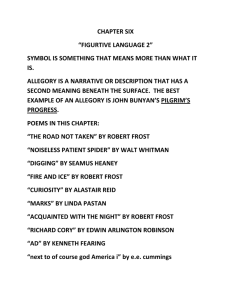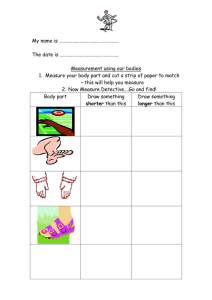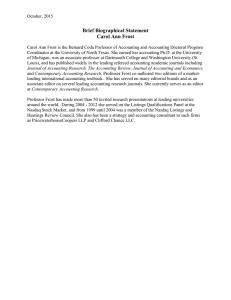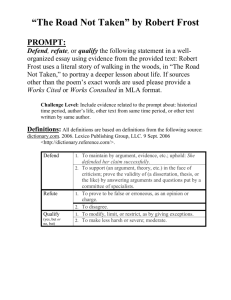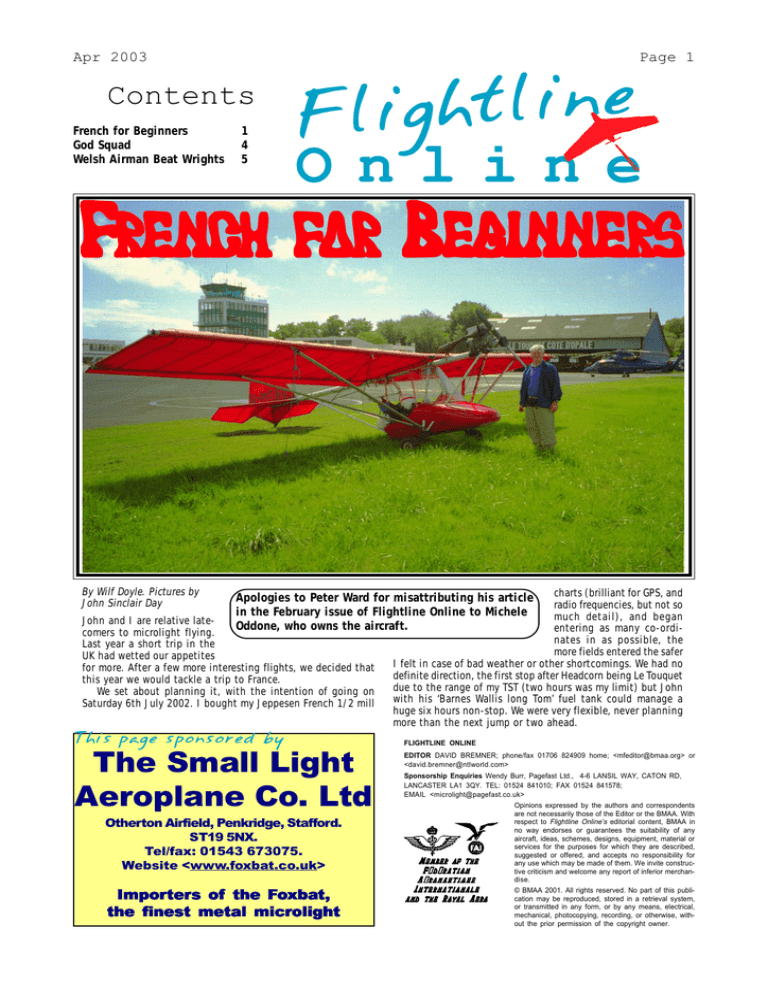
Apr 2003
Page 1
Contents
French for Beginners
God Squad
Welsh Airman Beat Wrights
1
4
5
e
n
i
l
t
h
g
Fli
Online
French for Beginners
By Wilf Doyle. Pictures by
John Sinclair Day
charts (brilliant for GPS, and
radio frequencies, but not so
much detail), and began
entering as many co-ordinates in as possible, the
more fields entered the safer
I felt in case of bad weather or other shortcomings. We had no
definite direction, the first stop after Headcorn being Le Touquet
due to the range of my TST (two hours was my limit) but John
with his ‘Barnes Wallis long Tom’ fuel tank could manage a
huge six hours non-stop. We were very flexible, never planning
more than the next jump or two ahead.
Apologies to Peter Ward for misattributing his article
in the February issue of Flightline Online to Michele
Oddone, who owns the aircraft.
John and I are relative latecomers to microlight flying.
Last year a short trip in the
UK had wetted our appetites
for more. After a few more interesting flights, we decided that
this year we would tackle a trip to France.
We set about planning it, with the intention of going on
Saturday 6th July 2002. I bought my Jeppesen French 1/2 mill
This page sponsored by
The Small Light
Aeroplane Co. Ltd
Otherton Airfield, Penkridge, Stafford.
ST19 5NX.
Tel/fax: 01543 673075.
Website <www.foxbat.co.uk>
Impor
ter
s of the F
oxba
t,
Importer
ters
Fo
xbat,
olight
the finest metal micr
microlight
FLIGHTLINE ONLINE
EDITOR DAVID BREMNER; phone/fax 01706 824909 home; <mfeditor@bmaa.org> or
<david.bremner@ntlworld.com>
Sponsorship Enquiries Wendy Burr, Pagefast Ltd., 4-6 LANSIL WAY, CATON RD,
LANCASTER LA1 3QY. TEL: 01524 841010; FAX 01524 841578;
EMAIL <microlight@pagefast.co.uk>
Member of the
Fédération
Aéronautique
Internationale
and the Royal Aero
Opinions expressed by the authors and correspondents
are not necessarily those of the Editor or the BMAA. With
respect to Flightline Online’s editorial content, BMAA in
no way endorses or guarantees the suitability of any
aircraft, ideas, schemes, designs, equipment, material or
services for the purposes for which they are described,
suggested or offered, and accepts no responsibility for
any use which may be made of them. We invite constructive criticism and welcome any report of inferior merchandise.
© BMAA 2001. All rights reserved. No part of this publication may be reproduced, stored in a retrieval system,
or transmitted in any form, or by any means, electrical,
mechanical, photocopying, recording, or otherwise, without the prior permission of the copyright owner.
Flightline Online
Apr 2003
After Le Touquet it was of course
Abbéville. Our trip down the country from
Eshott was almost uneventful, only marred
by the attitude of our bigger brothers. We
had intended to refuel at Clacton, and having phoned them for PPR were firmly told
by the female answering the phone that they
don’t ‘do’ microlights. I quoted the
Lockyears and AFE guides that this was not
mentioned, but to no avail. Thank you
Clacton; perhaps you’ve never heard a 172
on full throttle at takeoff.
Nayland on the other hand (my alternative) was more than helpful, and what a
strip, certainly not for the faint hearted.
The France trip almost ended there as runway 32 filled all my forward and upward
vision! These chaps must have steel in their
blood landing on this very uphill strip.
Parked at the top was the latest result, minus nosewheel, of this testing, but very
friendly strip.
The next stop was Headcorn. Getting
there through the mist and rain was quite a
challenge, and a test of navigation, skirting round Southend on sea, over the Thames
and round Rochester to dodge thick cloud,
the last ridge surrounding the airfield about
the limit. John and I had noted the school
playing fields on the ridge top as a last
resort, but as we cleared the ridge it opened
up and we dropped into Headcorn through
the mist and rain, glad to be down.
Two precious days were wasted at
Headcorn due to horrible weather. John
Only 18 miles? It certainly feels
like more...
noticed he had a puncture on the second
day, but thanks to the very helpful staff
(Dave the instructor in particular), and Gerry
from the Tiger Club for a tube and hangarage, we were once more in the running.
Filing our flight plan and customs clear-
This page sponsored by
Page 2
Le Touquet, and time to put the
lifejacket away again
ance, with a little help from Jamie, was not
the big problem we thought it might’ve
been. The second day we had tried to make
a go of it but had to turn back due to a wall
of cloud and had to cancel our flight plan
when we returned (after 14 mins in the air).
Butterflies kicked in as we dressed à la
lifejacket and we checked and rechecked our
aircraft, then we were off and on our way
among fluffy white clouds at 1500 to 2000
feet.
The Channel streamed away below us on
a warm sunny July day, the cloud was at
1500 feet, but broken, and the wind was
behind us.
As we came up to Folkestone the GPS
gave a reading of 22 miles to Cap Gris Nez.
As Dover was still five miles on, and fuel
was in short supply we turned right here
and quietly and mentally quoted ‘Feet wet!’
- we were finally on our way. The shipping
was scarcer than expected; only about three
large ships (large enough to land on) a few
yachts and fishing boats, but all within
range. It was about seven or eight miles
out before we could see the long finger of
Cap Gris Nez reaching out from mainland
Europe, and then before we knew it we were
there, over Cap Gris Nez and ‘Feet dry’. The
first thing I noticed was a large gun emplacement turned into a museum, so I cut
the power and popped down for a closer
aerial look at France. We trogged along the
coast past a beautiful little strip not on
the chart to the South of Boulogne Sur Mer.
As we approached Le Touquet airspace
we gave them a call on 118.45 (as shown
on the Jeppesen charts, very handy!), and
were told to give them a bell when the field
was in sight. Among the chatter of 172,
Cardinals and larger stuff we were instructed
to land straight in over the town and docks
to the North, keeping a close eye on the
big yellow crane, for runway 24, keeping
quite high with a final steep sideslip onto
24. We taxied in, parked up, took a photo,
shook hands, cleared customs and fuelled
up. A chap with a brand new Cardinal shook
his head after looking over our aircraft and
smiled to himself. ‘How long did it take you
to cross?’ he said. ‘25 minutes’ I replied and
smiled back - I wouldn’t have swapped aircraft with him for the world at that little
moment of achievement.
Then we secured our aircraft and walked
into town for a delicious lunch of moules
mariniére on this wonderful warm day. For
anyone else landing there, the best place
to secure microlights is on the grass right
beside the airfield restaurant, well away
from the big stuff.
The walk back settled our lunch beautifully, and we set off for Abbéville, south
along the coast until we reached the massive Somme estuary. Quite a sight in the
sunshine.
Abbeville is a nice little grass strip with
its own customs facility and a more apt
place for microlights if you have the range.
There is an hotel on site and a delightful
restaurant with friendly staff. We tied our
aircraft down outside our hotel windows and
settled down to great food and wine.
From here on in, a little, or a lot of spoken French was greatly appreciated by the
locals, and handshakes all round are a wonderful and greatly accepted French welcoming gesture. The next day on the way to
Dreux Vernouillet via Monte Cherence we got
a taste of thermals á la française. Rocking
horses all the way, every day, and our first
realisation of just how big France is. Field
Flylight Air
spor
ts Ltd
Airspor
sports
Sywell Aerodrome, Northants. NN6 0BT. Tel 01604 494459. Website <www.flylight.co.uk>.
.
For all micr
olight tuition needs
uf
actur
er
s of the Doodle
bug ffoot-launc
oot-launc
hed air
cr
aft,
microlight
needs.. Man
Manuf
ufactur
acturer
ers
Doodleb
oot-launched
aircr
craft,
UK impor
ter
s ffor
or Air Créa
tion and Sk
y R
ang
er
importer
ters
Création
Sky
Rang
anger
er..
Flightline Online
after field, village after village, on and on.
All very similar and confusing.
We had already decided, due to the lack
of 1/4 mill charts, to use GPS all the time,
with plenty of waypoints along the journey, comparing the chart and bearings as
well. This proved to be a wise move as most
of the area we were flying through looked
incredibly similar, only clarifying when we
came across a larger town or site or obstacle.
Monte Cherence is mainly a gliding site
with a few microlights in one of the hangars, all managing admirably on a great big
field. We fuelled up and after politely refusing the offer of a cooked meal took off
over the ridge overlooking the river Seine
below us. What a view!
We made rough progress toward Dreux
Vernouillet, another microlight strip on the
southern end of town. This place is well
worth a mention. No problem with fuel,
Mogas here, provided by the instructor
Jacques, with a Rotax dealer and workshop
on site to boot. We were dropped off at the
supermarket café for a bite to eat, and when
we got back all was at our disposal. Not
having any particular direction or idea we
were recommended to visit a little farm strip
at Aron owned by Jean Pierre Foret. A call
was made, co-ordinates supplied, and off
we went via Mortagne au Perche, landing at
Alençon on the edge of town late afternoon
amid glider towing. Again we were warmly
welcomed and fuelled up, chatted to, about,
and inspected with curiosity and admiration from the local flyers.
The light was failing as we dropped into
Aron. The clubhouse was unlocked so we
cleaned up, unpacked and hangared our
craft.
Later on we met the family and even later
Jean Pierre himself after he had finished
with the harvest. Luckily he spoke a little
English and we got along like a house on
fire. He runs a flying school here with regular contact with English schools including
Deepak at Chatteris. The family meal was
wonderful and we were made to feel at home
with them all, from grandparents to grandchildren. After a nightcap we spent the night
in comfortable barn accommodation, sleeping soundly.
We left the next morning bright and early
heading for La Flèche and yet another sur-
Ah... The Englishman Abroad!
Page 3
Ploemel, and a Balerit parked on the grass
Apr 2003
prise.
On landing and taxiing to the fuel pump,
I got out and did the usual greeting and
handshake ‘Bonjour monsieur, comment ça
va’ and the reply was ‘Alreet. How’s yerself’.
We had, quite unexpectedly, dropped in on
an English flying school in the middle of
France called Leading Edge and run by Reg
Whittall. The chap I spoke to was Ian Bell
who minutes earlier had just completed and
passed his GFT - I should’ve known by the
grin all over his face. We shook hands again
and congratulated him. Reg trains only English speaking flyers on a one-to-one concentrated course, the benefit being of
course the French weather and constant
training available.
Heading for Saumur we noticed stormy
weather ahead and managed to arrive before the rain. The tower was hidden against
the backdrop of heavily wooded trees, consequently we landed at the parachute club
end, on the grass. Having just switched off
our engines we were inundated with parachutists. The jumpers didn’t seem to mind
us at all, so when their Porter picked up
the next group John and I followed it down
the strip to the fuelling point. The staff were
just about to zoom off for lunch when an
official stepped in and ensured we were
looked after first. We found out after lunch
that they don’t like microlights here, but
nevertheless they put up with and catered
for us admirably.
We decided to walk into Saumur, famous
for its Cavalry connection. Riding boots were
prevalent.
Lunch during a downpour was good timing, and thoroughly enjoyed. Time was getting on and during a break in the weather
we were off. The flight down the Loire valley was worth it, even though cloud, mist
and sporadic rain tried its best to spoil it.
Very interesting views, and lots of beautiful chateaux. We landed at Ancenis only to
see the local instructor taking off with a
pupil and the keys to the fuel pump. Nevertheless, in preparation for occasions such
as these, I filled up from my spare fuel containers and pushed on to La Baule.
As we approached Nantes we had to divert south of the city and airport due to a
massive thunderstorm blocking our way
north. A one hour trip turned into a two
hour nightmare as we could see Nantes from
what appeared to be the same position for
over an hour. We hopped over thick broken
cloud at St Nazaire and dropped into La
Baule at 2100 hrs, just as Pierre was locking the bar for the night. However he managed to book us a room at Hotel Le Tennis
before leaving, a delightfully quaint seaside hotel, whose owner picked us up and
dropped us off both days we spent there.
This page sponsored by
Ozee Ltd
R/O 497 London Road, Westcliff-onSea, Essex. SS0 9LG.
Tel 01702 435735.
Website <www.ozee.co.uk>.
Oz
ee
uf
actur
er
s of high quality
Ozee
ee,, man
manuf
ufactur
acturer
ers
flying suits
Apr 2003
Flightline Online
Page 4
Valéry.
The airfield at St Valéry is, like most other French airfields,
superb, but it has a road crossing it at the end of the runway to get
to the clubhouse and fuel. A careful crawl, quick looks left and
right and then a rapid burst of throttle was required to see us over
safely.
The landing at Le Touquet was full of drama. Firstly we dropped
off at Berck-Sur-Mer, with the intention of saving time by refuelling there, but the place was empty, and the wind and heat were
rising. John was pitched almost sideways as he cleared the wood
to the north on takeoff, then as we arrived at Le Touquet at a time
when everyone was lunching during the heat of the day except for
us, I came in on runway 32 and as I was settling on all three
wheels the right wing was lifted by thermals and a crosswind. As I
tracked toward the runway lights and grass verge I applied full
power, raised her off the deck and brought her back down further
up. Then as she settled, the same thing happened again. This time
I managed to keep the right wing down a bit more and ground
La Baule itself is beautiful, a 10km beach, plush hotels and plenty
looped it onto
the grass to a safe halt, followed by ‘Gof places for a good meal. It reminded me of Torquay with panache.
MTGU vacated runway 32’, taxied over
The Anglais-Valent Flying School is at La Baule
the grass and parked by the restaurant.
run by Phil Lee. He is the French
Once inside the airport manager
main dealer for Mainair Sports,
d
a
God Squad
charged me only half a landing fee ‘for
n he gets
he
W
.
a very helpful and French speaken
to heav
ding (the
es and goes
the landing’, he said. I’m not sure
re he is stan
ing chap.
he
w
s,
This guy di
ur
om
fr
ho
for
e stretches
ands in line
whether he was patting me on the back
st
e
He
s.
lin
The wind ensured an extra
there the lin
e
ile
t th
view for m
into days bu
or insulting me but we both grinned
back) out of
walks to
Hours turn
stay at La Baule so the oysters,
d
g.
an
in
e
ov
lin
m
t of
without it
. He gets ou
widely.
ed
ov
m
sardines and paté foi gras took
.
t
r
te
has still no
ds Saint Pe
to stand in
It was getting late and the wind
here he fin
me I have
a hammering again.
co
e
ow
th
the front w
H
ed
llow
, he says
my life, I fo
was
rising so we left our channel
of
t
l
Saint Peter
al
n
The next day saw us heading
ca
an
I
m
come
was a good
urch. How
this line? I
crossing until the next day. Not a bad
went to ch
homewards via Ploemel. On
I
,
ts
en
le
Commandm
place for our last night in France. We
many peop
Heaven?
reaching the field I did my usual
ere are so
just get into
onths to
ter But th
m
Pe
s
ke
ys
ta
were up and at the airport for 0800.
sa
is
at
call ‘Nous somme deux ULM
th
t
Sorry,
ai
ys
w
da
to
e
ve
aven thes
go ing to ha
Unfortunately it didn’t open until
st
ju
e
ar
Anglaise, en provenance de La
entering he
ou
yone out. Y
check ever
0900, and neither did anything else!
of the line
Baule a vos instalation’.
d
en
e
th
.
ck to
your turn
to he ad ba
walking up
An hour later and we were on our
s
it
rn
su
tu
This was followed by ‘Nous
ht
an
ig
The m
essed in a fl
mirrors,
way chasing and dodging the early
es a man dr
as bright as
ed
somme en dernier virage’, (finals)
in
psh
ca
e
whe n he se
s
ar
hi
, and
. His boots
impeccable
morning mist until we came to Cap
d
ks
al
an
to the gate
the reply, if there was one, was
w
d
se
n. He
suit is pres
p like the su
his flight
Gris Nez when it cleared well enough
and strolls
his flight ca
,
sometimes too much for my underon
te
e
lu
in
sa
a
sh
Peter
tains bars
te, throws
for a crossing at 1500 - 2000 feet.
ga
e
th
standing, but the idea being that
to
t
right up
does he ge
Seeing the white cliffs of Dover,
guy? Why
flyers in the area knew that two
at
th
on in.
ith
.
an
e de al w
asked the m
even at ten miles out is enough to
?
r
in
Whats th
Ai
t
English microlighters were about to
an
gh
ri
s
d he
and walk
es to preten
to skip line
send the heart thumping. 32 minLord. He lik
disrupt their airspace, please give
e
th
s
at
Oh, th
ter.
utes after ‘Feet wet’ we were again
Pe
ys
sa
way! Here at Ploemel we were apt.
Force pilo
‘Feet dry’, a little head wind complauded when they learned we had
pleting things just to make us feel at home.
flown all the way from NorthumberAfter refuelling at Headcorn we carried on to Earls Colne, a
land. Alain (a 17,000 hours ex-Mirage fighter pilot) drove
helpful and friendly airfield with local problems (if you drop in
me into town for fuel. I couldn’t understand a word that was spothere please ring for instructions).
ken, when Alain explained their proud Celtic provenance, ‘Celtic
Chatteris was the last stop of the day and with the help of
not French’ he would say.
Deepak we spent the night in a friendly and comfortable B and B.
As the day was getting hotter we made off for Mont St Michel. A
The last day saw us streaming homewards to North Coates, then
little microlight strip is just south of the Mont - only we didn’t
after a bit of tree-clipping at Baxby a tailwind carried us all the
know just how little. The GPS took us straight there, but all the
way up the coast to Eshott by about 1800 hrs. All in all a wonderfields looked the same, and this one looked rougher than the rest.
ful, inspiring and exhilarating trip, read about and done by many
After twenty minutes of searching I put down in it after seeing a
microlights before, but oh so much better when it’s you doing the
tiny windsock, crosswind of course, as was almost every landing
journey.
we did in France. John followed and as there was no one around I
refuelled from my spare cache.
We took off directly after refuelling only realising as we flew
over Avranches on the other side of Mont St Michel that it was far
This page sponsored by
superior and open for business.
Flers St Paul was our overnight camping stop, a pleasant GA
and microlight strip with overtones of mixed feelings between them.
The Sea Rey Amphibian Beached on Pender Island
Up bright and early after a decent meal and walk around the local
The undercarriage rotates upwards on the water
Chateau, we pushed on for Bernay St Martin. After passing Falaise,
a little strip on the top of a hill, we encountered early morning
mist rising from the valleys and decided to land back at Falaise
and make some breakfast, giving the mist time to evaporate.
Eventually we pushed on to Bernay St Martin, home of the CAP
Unit B
awf
or
d Str
eet, R
oc
hdale
B,, Cr
Cra
wfor
ord
Street,
Roc
ochdale
hdale,, Lancaaircraft industries, landing in another strong crosswind. The fuel
shir
e
.
OL16
5NU
.
T
el
01706
655134.
shire
5NU.
had been locked up for the day and three departing Belgians, all
Website <
www
.mainair
spor
ts
.co
.uk
>.
<www
www.mainair
.mainairspor
sports
ts.co
.co.uk
.uk>.
flying tail dragger Rans Coyotes, insisted on selling me 20 litres of
their spare fuel before they departed. The wind increased so we
camped overnight next to our aircraft, went into town for a sumptuous meal and left first thing in the morning for the coast at St
Mainair
Thanks to Aeroclub d’Andaines French vocabulary for Flyers. On
Apr 2003
Flightline Online
Page 5
Welsh Airman Beat Wrights to the Skies
SUNDAY TIMES 26 July 1998
by Andrew Alderson
On a summer’s day in 1896, a Welsh carpenter named Bill Frost may have
achieved one of man’s greatest ambitions: he flew.
Until now, history has credited the Wright brothers with conquering the
skies. But new evidence suggests that their famous flight was not the first.
Seven years before then, Frost is said to have set off in a ‘f1ying machine’
from a field in Pembrokeshire and stayed in the air for 10 seconds.
Newly discovered documents reveal that Frost, from Saundersfoot,
Pembrokeshire, applied to register a patent for his invention - a cross be-
tween an airship and a glider - in 1894.
It was approved the following year and detailed how the invention was
propelled upwards by two reversible fans. Once in the air, the wings spread
and are tilted forward ‘causing the machine to move, as a bird, onward and
downward.’ A fan is used to help the aircraft ‘soar upward’, while the steering
is done by a rudder at both ends.
Crucially, locals in the Welsh seaside resort insist that the aircraft was
built and flown within a year of the patent being approved. Yesterday experts on both sides of the Atlantic believed that the name of William Frost,
not the Wright brothers, deserves pride of place in aviation record books as
the first pioneer of manned, sustained and powered flight.
Historians, descendants and a former neighbour of Frost are convinced
that only his modesty in failing to acclaim his role or having a photograph of
the flight meant his achievement went unacclaimed.
Roscoe Howells, the historian and writer, used to be a neighbour of Frost
in Saundersfoot and heard an account of the flight from the inventor himself. ‘He became airborne, so he said, and I would never believe that Bill
Frost was a liar or a romancer,’ said Howells.
‘His flying machine took off, but the undercarriage caught in the top of a
tree and it came down into the field. If he hadn’t caught it in the tree, he
would have been right over the valley over Saundersfoot and it would have
been death or glory.’ Nina Ormonde, Frost’s great-great-granddaughter, said:
‘Our family has always known that he was the first to fly. He flew for 500 to
600 yards. But Bill gave up on it and there is no point us revelling in the
glory because it was his achievement.’ Frost’s flying machine was 3lft long
and made of bamboo, canvas and wire mesh, with hydrogen-filled pouches
to attain ‘neutral buoyancy’. The Wright brothers’ plane was only 22ft long,
yet had a wing span of 44ft and was powered by a petrol engine. On Decem-
ber 17, 1903, Orville Wright, watched by his brother Wilbur, flew above the
sand dunes of Kitty Hawk in North Carolina. The initial flight lasted 12 seconds.
Frost was born in Saundersfoot in 1848 when it was a poor mining and
fishing village and he worked as a carpenter and builder on the nearby Hean
Castle estate. He founded the local male voice choir and was a deacon of the
chapel. His determination to fly his aircraft after the initial flight was defeated by bad luck and lack of money. Although he repaired his machine
after hitting the tree, it was later ripped from its moorings and damaged by
gales, apparently in the autumn of 1896.
He later travelled to London and tried to get funding from the govern-
ment’s war department. According to Frost’s descendants, he received several approaches from foreign governments for the rights to his patent, but
refused on the grounds of patriotism.
In an interview given in 1932, three years before his death, Frost described himself as ‘the pioneer of air travel’. Then aged 85 and blind, he
spoke of his lack of funding after the war department dismissed his efforts,
arguing ‘the nation does not intend to adopt aerial navigation as a means of
warfare’.
Jeff Bellingham, a British-born mechanical engineer now living in Minnesota, first discovered Frost’s invention after reading Howells’s local history hook and deciding, on a whim, to see if the inventor had filed a patent.
Today, a century on, there is a new race. Bellingham intends to build a
replica; first a quarter-size and later a full-size one, of Frost’s aircraft. ‘I
believe it (Frost’s craft) will fly and that afterwards people will acknowledge
the history books are wrong,’ Bellingham said.

